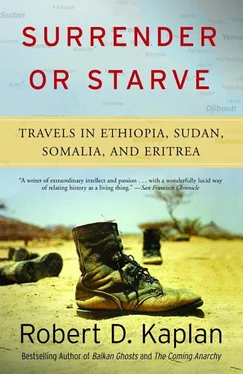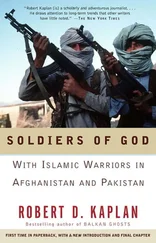The real hosts in “Addis” went unseen. Addis Ababa was conceived by Menelik as an Amhara fortress, and its most striking architectural detail is its walls, whether of stone, mudbrick, wattle, or corrugated iron. High walls of stone block off the sprawling grounds of the palace from public view, and few members of the Western community ever were allowed to see beyond these walls. Mengistu and the rest of the eleven-person Politburo met rarely with resident nationals of countries outside the Third World or Eastern bloc. Only for Kurt Jansson, a native of neutral Finland and the U.N. assistant secretary general for emergency operations in Ethiopia, was an exception made. (Mengistu was especially shrewd about whom he chose to receive among the temporary visitors from the United States. As I mentioned, he never agreed to meet with USAID administrator McPherson, who was directing the delivery of one-third of all the emergency assistance reaching Ethiopia from the outside world. But the Ethiopian leader did meet with liberal Democratic congressman Howard Wolpe—by Washington standards an apologist for the regime—and with singer Harry Belafonte, whose twenty-minute meeting with Mengistu in June 1985 was partly taken up by a discussion about human rights violations in South Africa.
The policies of the Dergue were invisible, too. Visits to resettlement and villagization sites, with the exception of showcase camps, were prohibited. The chilling reports of large-scale human rights abuses usually filtered into “Addis” by way of refugee stories from Sudan and therefore were treated with deep suspicion; the product merely, it was thought, of exaggerations and interviews with refugees conducted through biased translators sympathetic to the Tigrean guerrillas. Like the regime, many nongovernmental Western aid people in Addis Ababa saw the Tigrean and Eritrean guerrillas as “bandits” who were largely to blame for the regime’s failure to get more food to the countryside. The aid community had few ways of knowing that the guerrillas in the north were among the most sophisticated insurgents in the world, enjoying mass popular support, and that the regime often was bombing the places it professed to be feeding. There never were any reports in the official media about the fighting. Many relief officials had no interest in finding out. The vacuum of official information in Addis Ababa, as in other Eastern bloc capitals, was sufficiently formidable for rumors to be far more prevalent than facts about such issues as resettlement, villagization, and the war in the north. In fact, the difference in perceptions between the foreign community in Addis Ababa and the one in Khartoum (which functioned as a rear base for the guerrillas) was almost as profound as that between the foreign communities in Tel Aviv and Damascus.
There were, in fact, two Ethiopias—the one inside the water-tight compartment and the one outside. Outside was the war, the Dergue, its East German–advised security service, the thousands of political detainees, and the drive toward collectivization. This world—the world inhabited by Mrs. Ahmed and the Oromos of Hararghe, whose troubles began about the same time that Westerners began pouring into Addis Ababa—constituted a reality that was somewhat vague, suspect, and threatening to the foreigners who didn’t want to be ejected all at the same time. It was best not to bring this world any closer by provoking it. In Sudan, the famine-wracked country next door, openly discussing the evil qualities of the pro-U.S. government of Jaafar Nimeiri was one thing, but in Ethiopia, where the evil was of an entirely different magnitude, it was quite another. Criticism of Mengistu by Westerners in Addis Ababa was muted. When a French relief group, Medicins sans Frontieres (Doctors Without Borders, or MSF), was thrown out of Ethiopia for unreservedly criticizing the resettlement program, the Western community of Addis Ababa did not come to the group’s defense. Everyone appeared to run for cover.
After all, the world inside the compartment—the world of Dawit, the RRC, and RRC-approved day trips to emergency feeding centers—contradicted much of what was outside and much of what Medicins sans Frontieres was saying. The RRC might have been bureaucratic, as everything in Ethiopia traditionally was, but it was not corrupt. With persistence, the bureaucracy could be circumvented, couldn’t it? Was there a more dedicated and efficient African relief organization than the RRC? Didn’t the very efficiency of the RRC testify to the positive qualities of the Dergue and to the Dergue’s commitment to the relief effort? Wouldn’t more Western support for the RRC improve Dawit’s bargaining position inside the palace? Wasn’t this the very way in which to draw Ethiopia toward the West?
It was true; the RRC was not corrupt. Grain shipments very likely were misappropriated in Ethiopia by the government for strategic reasons, but little of the grain was pilfered for personal gain. Mengistu, his other faults notwithstanding, did not tolerate the level of thievery common to countries such as Zaire and Nigeria. As I’ve suggested, were he more corrupt, less people might have been murdered and tortured. As to the bureaucracy, it certainly could be managed, but that depended upon who you were. U.S. Embassy officials and others likely to ask critical questions always seemed to have difficulty getting permission to travel outside the capital. General Julius Becton, Jr., director of USAID’s Office of Foreign Disaster Assistance, told Newsweek (June 3, 1985), “[Ethiopian] officials knew I was going to be there 30 days in advance. But the night before I was supposed to depart I was told, ‘We don’t have your travel permits.’”
Admittedly, the efficiency of the RRC was impressive. But this was not due to any humanitarian commitment on the Dergue’s part. In Ethiopia, administrative finesse was not exclusive to the RRC. Ethiopian Airlines was the best-run national carrier in black Africa; the airline’s record of punctuality was as good as many airlines in the West. The guerrilla-affiliated relief agencies in Tigre and Eritrea were just as effective as the RRC and quite a bit more resourceful considering the more difficult conditions under which they had to work. Just consider: could the government of any other sub-Saharan country—after announcing an intention to collectivize several million people—actually be able to do it, however crudely? Ethiopia’s hunger and poverty may have been typically African, but the causes weren’t. The under-development of the northern provinces could not be blamed on ignorance and incompetence. Efficiency was a national trait, and while one branch of the bureaucracy was effectively working to save lives, others were operating just as effectively in a different direction.
Rather than draw Ethiopia toward the West, as many in the Western community in Addis Ababa predicted, the relief effort coincided with a further radicalization of the Dergue. At the beginning of 1985, when the Hilton was literally bursting with Western visitors, four Marxist ideologues—Alemu Abebe, Shewandagan Belete, Shimelis Mazengia, and Fassika Sidelel—nicknamed the Gang of Four, emerged as Mengistu’s top advisers. On February 9, an austerity program was announced that was aimed at further decimating the urban middle class. Also, government employees earning more than $250 per month were from then on required to wear North Korean–style tunics in place of Western suits; this was another measure that reinforced Marxist aesthetics. In April, at a meeting of the Workers’ Party of Ethiopia, Mengistu praised the Soviet Union and condemned “American imperialism” but made no mention of the massive Western relief effort. In May, the pace of forced collectivization increased. Meanwhile, Dawit and his associates, having succeeded at bringing the famine under control, were becoming more and more isolated. Anyone with any political street-smarts could have predicted Dawit’s demise. If there really had been an opportunity for a basically pragmatic, Western-oriented official such as Dawit to increase his influence inside the palace, the regime would have had a different personality than it did.
Читать дальше












